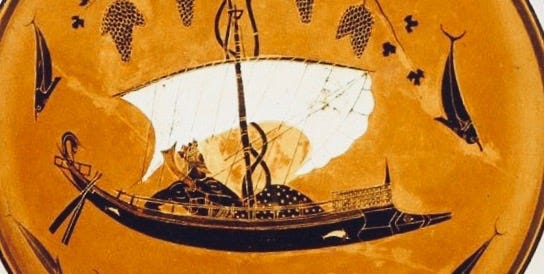The Ship of Theseus
A story in verse
Aegeus, aged king of Athens, awaits the return of his son Theseus from Crete where the hero has killed the monstrous Minotaur.
Aegeus has asked him to hoist white sails as news of success; black sails mean he’s failed. Theseus forgets the request, and when Aegeus sees the black-sailed ship returning from Crete he throws himself into the sea in sorrow.
“Dwellers by Ilissus river Tillers of Athena’s loam: See you now the sails a-quiver? Theseus’ ship returning home?” “King, the star that shuts the even 5 Calls the sheep from Parnēs down; Home return the doves from heaven, And the prince to Pallas’ town.” Hastening from their Cretan glory, On the foam-flecked waves they cross; 10 Hoisted sails must tell their story: White for triumph, black for loss. “Drinkers of the nine-mouthed fountain, You who mine the argent vein: Comes he safe from Ida’s mountain? 15 Shining sail-sheets see you plain?’ ‘King, my eyes are not unerring: Still the sails are scarce in sight; Far I see a shadow stirring; That I spy. I spy not white.’ 20 ‘’Look once more, your head inclining (It is eve and I am old) Tell me Theseus’ sails are shining White, more precious far than gold; I am old, and day is ending, 25 And the darkening night falls fast; Up to Sounion’s cliffs now wending Spy you not white sails at last?’ Loud the land with sounds of mourning. Cold the body from the waves. 30 Home is nigh and day is dawning: Proud the hero comes who saves.
Many readers will recognise that this is modelled closely (some phrases are copied) on the sublime Atys by A. E. Housman. That poem similarly tells the story of a father, Croesus, who awaits his son's return from the boar hunt; but in that case it's the son whose body returns cold and dead.
Explanatory notes:
Line:
1 Ilissus: the river that runs through Athens. 2 Athena's loam: the earth of Athens, whose patron goddess was Athena 5 shuts the even (Housman's phrase) means 'ends the evening' 6 Parnes: one of the central hills of Athens 8 Pallas: another name for Athena 13 nine-mouthed fountain: a feature of ancient Athens, the Enneakrounos spring 14 argent vein: silver mines in Athens' territory enriched the city 15 Ida: the highest mountain in Crete 27 Sounion: the southernmost cape of Athens
29-32 Housman's moving last stanza shifts the focus from the anxious watchers to the troop returning home with Atys's dead body: Hounds behind their master whining, Huntsmen pacing dumb beside, On his breast the boar-spear shining, Home they bear his father's pride.



Bravo!
Thank you for a fine poem, reminding us of another fine poem. Housman's poetry is often undervalued or seen as staid. But I can still recite 'The Cherry-tree' (from A Shropshire Lad), 50 years after I was made to learn it in school.